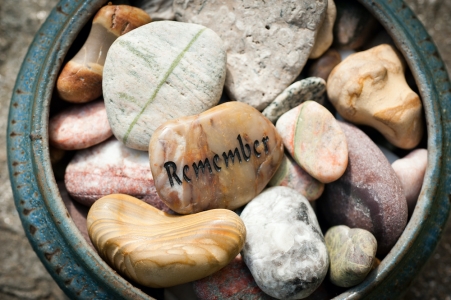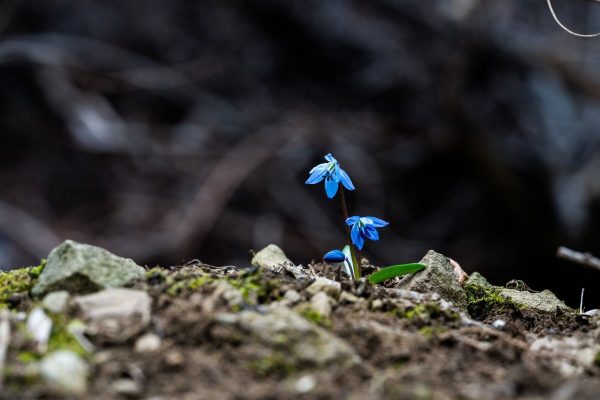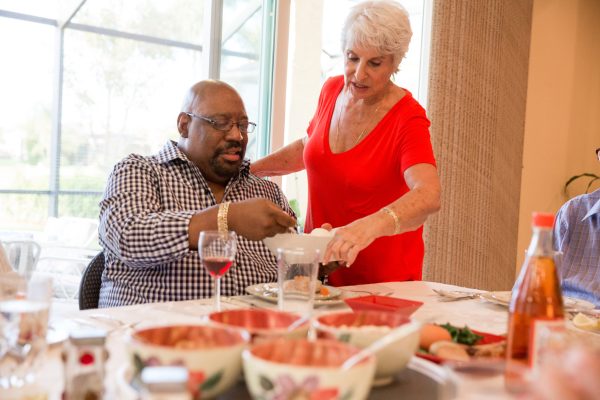Ritual Elements: bowl, water, salt, stone
In preparation for our Pesakh Yizkor service, we perform this ritual of remembering:
1. FIRE:
Light your candle. Pause to observe the flame.
נֵ֣ר יְ֭הוָה נִשְׁמַ֣ת אָדָ֑ם (Proverbs 20:27)
Mishlei, Proverbs, teaches that every human soul is a candle of the Divine, a source of light, made to shine and illuminate the world. As we light our candles, we reignite the flames of memory, bring to mind those whose lives brought light to our lives.
2. WATER and SALT:
Pour water into your bowl and place a small amount salt into the water. Take a moment and observe the salt settle. If you wish, gently stir the salt into the water, being mindful of the circular motion of your finger and the feeling of coming full circle as your finger gently moves through the water.
Salt symbolizes purity, springtime, and the sea—the mother-source of all life.
As we know from our PassoverPassover is a major Jewish holiday that commemorates the Jewish people's liberation from slavery and Exodus from Egypt. Its Hebrew name is Pesakh. Its name derives from the tenth plague, in which God "passed over" the homes of the Jewish firstborn, slaying only the Egyptian firstborn. Passover is celebrated for a week, and many diaspora Jews celebrate for eight days. The holiday begins at home at a seder meal and ritual the first (and sometimes second) night. Jews tell the story of the Exodus using a text called the haggadah, and eat specific food (matzah, maror, haroset, etc). sederLit. Order. The festive meal conducted on Passover night, in a specific order with specific rituals to symbolize aspects of the Exodus from Egypt. It is conducted following the haggadah, a book for this purpose. The mystics of Sefat also created a seder for Tu B'shvat, the new year of the trees., salt water symbolizes the tears shed during our enslavement in Egypt, that narrow, confined place.
Salt water also symbolizes our grief—the salty tears we shed at the time of the loss of our loved ones and perhaps will shed again now, as we remember those we love and from whom we have been physically separated and our hearts return to touch the place of the tight constriction of grief.
3. STONE:
Gently release the stone into the bowl of salt water. Observe how it simultaneously displaces and integrates into the salt water.
Stones symbolize endurance, stability, and permanence. When we leave a stone on the grave of a loved one, we build a matzevah—a sacred pillar of memory.
Our tradition teaches us of another symbolic use of stones: the creation of a mizpakh, a “watchtower.” This structure, the TorahThe Five Books of Moses, and the foundation of all of Jewish life and lore. The Torah is considered the heart and soul of the Jewish people, and study of the Torah is a high mitzvah. The Torah itself a scroll that is hand lettered on parchment, elaborately dressed and decorated, and stored in a decorative ark. It is chanted aloud on Mondays, Thursdays, and Shabbat, according to a yearly cycle. Sometimes "Torah" is used as a colloquial term for Jewish learning and narrative in general. tells us, marked an agreement between two people with God as their witness.
The words associated with the mizpakh—“The Lord watch between me and thee, when we are absent, one from another”—are the words that we hold onto as we remember our beloveds who are always in our hearts and engraved into our memories.
As we hold one another in our communal remembrance and, together with the Holy One, serve as witnesses for one another’s grief, may we maintain our watchtowers, knowing that neither death nor life separates us from those we love.













